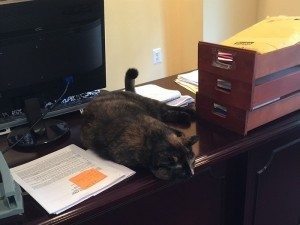 Dear Angel,
Dear Angel,
I understand that June is National Safety Month. My mother lives alone, and I want her to stay safe. What is some advice that I can give her to help her stay safe in her home? Thanks so much for your help!
Saif Ti
—
Dear Saif,
Happy National Safety Month! Since 1996, National Safety Month has aimed to increase awareness of safety and health risks in homes and communities, on the road, and in the workplace. The goal is to decrease the number of unintentional injuries and deaths for people of all ages in the United States. Today, we are going to focus on safety tips in the home, specifically for older adults.
What You Need to Do to Stay Safe in Your Home
Falls, burns, and poisonings are among the most common accidents involving seniors in our country, according to the American Geriatrics Society. With a growing number of older adults living independently, it’s important to know what you need to do to stay safe at home. Here are some tips:
- Keep your home well lit, especially in areas such as stairways and halls. To avoid falls, you’ll want a clear view of your surroundings.
- Use night-lights in hallways and bathrooms.
- Clear hallways, stairs, and pathways of books, shoes, etc., and make sure these places are well lit. When going up and down stairs, use rails and banisters. Tape all area rugs to the floor or make sure they all have backings that prevent the rugs from moving, and NEVER place a throw rug at the bottom or top of the stairs or at the side of the bed.
- Make sure medical alert communication systems are easily accessible, or wear a watch, such as an Apple Watch, which has built-in safety features. If there is an accident or injury, help can arrive on the scene with the push of a button or alert from the watch.
- Repair broken or chipped or loose steps, tiles, and flooring. A good contractor can help you with this. If the job is small, ask a handy friend or family member.
- Install smoke alarms on every floor and outside every bedroom. Preferably replace all your smoke alarms with the newer types that have a sealed battery that lasts for 10 years, so you don’t have to replace the batteries every year.
- Post emergency phone numbers and family and contact information on your refrigerator — this is where emergency personnel are trained to look. If you still have landline phones, then for your own benefit be sure your emergency contact list is easily accessible by each telephone and that the list is in large enough print so you can read it easily if you are frightened or in a hurry. Be sure to list numbers for:
- 911
- Poison control
- Emergency contact — family member or friend
- Health care provider
- Arrange your furniture to facilitate ease in mobility.
- Make sure there are no exposed electrical cords or extension cords that might cause tripping.
- Set the thermostat of the water heater at a maximum of 120 degrees Fahrenheit to prevent accidental scalding.
- Put rubber mats in the bathtub to avoid slipping. Install grab bars in the shower and near the toilet for safety and ease getting in and out.
- If you are having trouble with balance, walking, or have fallen in the past, ask your health care provider for a special falls risk assessment. Please see our recent article on this subject. You may need a special exercise program and/or an emergency alert bracelet or necklace. Carry a cordless or cell phone so you don’t need to rush to answer a call. Check your footwear — non-slip, flat, thin-soled bottoms that fit well are best.
- Protect against fire. Don’t wear loose clothes or long sleeves when cooking. Check appliance cords for fraying or damage. Avoid putting too many electrical cords in one socket or extension cord. Make sure heaters are at least three feet away from curtains, bedding, furniture, etc. Place an easily accessible fire extinguisher on every floor and, just as importantly, make sure everyone in your home knows how to use it.
- To avoid carbon monoxide poisoning, never try to heat your home with your stove, oven, or grill since these can give off carbon monoxide that you cannot see or smell. Place a carbon monoxide detector near all bedrooms and change the batteries as needed. Better yet, when you replace your smoke alarms, there are now combination smoke alarms and CO2 detectors with sealed 10-year batteries.
- Keep medications in original containers so you don’t mix them up. Ask your pharmacist to use large-print labels that are easier to read — and take your pills in a well-lit room. Regularly review your medication regimen with your health care provider.
- When it comes to cleaning products, never mix bleach, ammonia, or other cleaning liquids together — they can create deadly gases.
- Keep your windows and doors locked at all times. When alone, never let a stranger into your home.
- If a telemarketer calls, share all sales offers with a friend or family member after requesting the information in writing. Don’t be pressured into making telephone purchases or donations. Never give out personal information, Social Security numbers, credit card, bank information, or account passwords to people you do not know. Never send your credit card information in an email to anyone.
Although these tips may seem obvious to some, they’re certainly worth reviewing with loved ones during National Safety Month! Hope this is helpful!
Angel
Print This Page











